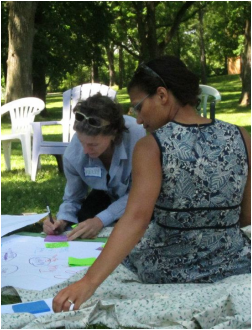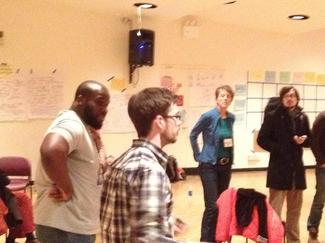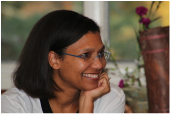| My friends and teachers Tuesday and Allen have set the bar here. This invitation to practice thinking beyond knowing and offering it to the blogisphere has been waking me up at night. For real, thinking together changes the wiring, which sounds like something our species needs right now. |
When Allen and I met in 2008, we almost immediately began de- and re-constructing movement building in the context of the Harm Reduction Movement, which had been my home for more than a decade by then. I met Tuesday in 2010, a few days after I was broken open by a personal trauma. At that time my foundation was so profoundly shaken, I could no longer trust what I thought I knew about the world. Since then, I have not only survived, but have grown wiser and more strategic thanks to these two and other friends.
"..our project becomes less of one based on self-improvement or even collective self-improvement, and more about the creation of new worlds and futurities for which we currently have no language."
-Andrea Smith
The healing began the day before Tuesday, three other colleagues and I were to begin co-hosting a three-day Art of Participatory Leadership training in NYC. I confided in a wise friend and activist Lisa Caswell that I was going to step out, because I could not function as a facilitator while in this state of shock and grief. Rather than consoling me, Lisa offered a profound way to continue. She told me of a Native American teaching where people in mourning are welcomed to bring their grief into community and wisdom councils; to show up with this human experience as an offering to the whole.
With this invitation to find and offer the wisdom that arises from personal trauma, I went forward as a co-host and was able to invite space for the grief that is in our hearts, communities, families and institutions. I named my quest during our opening circle ~ What does it take to invite our grief and loss in a way that serves our transformational work? During the following two and half days together, a transgender man and a Native American woman spoke to the nature of this quest from their particular experience in a way that expanded our group’s ability to welcome, hold and be with the grief that is present when we show up as whole human beings from many different experiences in America.
This was the first time that Tuesday and I worked together. It is also when we started a conversation about how the stuckness that we found in our respective social justice organizing spaces had catalyzed us to find and study new ways of being, thinking and strategizing together. After about a year of conversations and, often getting lost together, we co-hosted the transformative gathering where Allen entered this conversation. Coincidentally, the same week that we invited people to join us in this “three-day intensive exploring participatory practices for inviting and hosting game-changing conversations in our groups, organizations, communities and movements” Occupy Wall Street was hatched.
I joined the Facilitation Working Group of Occupy completely humbled by the General Assembly process. The first time that I attended a GA, the Declaration Work Group was asking for GA consensus approval of their draft so that their Solidarity Declaration could go to DC for the opening of their first Occupy camp the next day. A white anarchist guy in leather and Mohawk spoke to the Assembly “brothers and sisters, this is everything that I believe, but I am here to be part of the 99%, not another pedantic lefty group. Can we make it more accessible?” This was followed by a South Asian women’s collective offering to help with some of the language “so that we can stand by it,” which was immediately approved GA consensus style among the 300+ people in attendance.
Yesterday, one of the speakers at the labor rally said: “We found each other.” That sentiment captures the beauty of what is being created here. A wide-open space (as well as an idea so big it can’t be contained by any space) for all the people who want a better world to find each other. We are so grateful.
- Naomi Klein to the General Assembly, 2011
Needless to say, I fell in love with the movement. I had found my new true home. That is, until it regressed to the business as usual organizing tactics and behaviors that Allen spelled out in his blog. In the simplest terms, the hopefulness that arose from finding each other was not enough to hold us through the getting lost and innovating that would be necessary to become the kind of movement that is needed now.
The concept of coming together as a broad base of the 99% was born of the emerging social network/living systems era, which too many experienced activists tried to organize and centralize with industrial age tools. Spaces for ‘brother and sister’ and learning and teaching each other were the first to be sacrificed to analysis and prescription. Instead of looking each other in the eye with curiosity, we spent many hours debating a 5-page Anti-Oppression White Paper that one affinity group proposed would set the rules of engagement for the 99%.
My heart was broken again. Even so, as the tendencies to control and centralize escalated, I remained a voice of dissent in the Facilitation Work Group declining to facilitate the approved ‘consensus’ and ‘spokes council’ formats as my new friends burned out beside me.
Eventually, a few of us who had joined the Racial Justice Framework sub-group of the Facilitation Work Group (charged with studying ‘how to facilitate from a racial justice framework’ with RaceForward and bringing recommendations back to the Facilitation Work Group) began to host Open Space gatherings where we did not apply the 'progressive stack' that was used in all other OWS settings in order to ensure that white people and men did not dominate the dialogue.
During an early OS gathering, the first people to step forward and invite others into conversation were young, black and brown. They led their own session, produced a harvest and shared it with the Racial Justice Framework sub-group. This led to our primary recommendation to the Facilitation Work Group = do more Open Space. It never scaled however, as the revelation happened at about the same time that the wobbly center of Occupy Wall Street imploded.
"We never know how our small activities will affect others through the invisible fabric of our connectedness. In this exquisitely connected world, it's never a question of ‘critical mass.' It's always about critical connections."
- Grace Lee Boggs
While there is no longer a vibrant, recognizable center to the Occupy Wall Street Movement, there remains a living system of spaces ~ projects, collectives, cooperatives, friendships ~ that continue to grow and develop like the innovations that Allen blogged about and that are weaved together by invisible threads of connection. In fact, the originators of Open Space added, for the first time in many years, a new OS Principle as a result of noticing what was happening with the Arab Spring and Occupy Movements:
Wherever it is, is the right place...reminds participants that space is opening everywhere all the time. Please be conscious and aware. – Tahrir Square is one famous example. - Open Space Technology
This blog is yet another space open for finding each other. Tuesday, Allen and I are calling this conversation, opening this space, inviting others on life’s journey to think together and beyond what we know about social justice organizing. If you are intrigued by the possibility that it’s time for innovation and, rather than adapting to and regulating the old system (that never loved us), to build a new understanding of both healing and power, please engage.
Please offer your thinking, stories and inquiry here on this blog. Some of the questions in our hearts are:
What will it take for us to give up all we know in service of creating the world we want?
What does it really take to work for transformation rather than regulation and what are the next strategies that move us in that direction?
What is our shared work together now? What is the next level of our work to liberate ourselves and each other?
What would it look like to organize towards our liberation from systems that are causing us harm while creating new systems that sustain our well-being?
Also, please join us in person in New York City on November 20 & 21 when we enter a two-day exploration into lessons from system change work that has been driven by core teams and a deep practice of community/constituent engagement.



 RSS Feed
RSS Feed